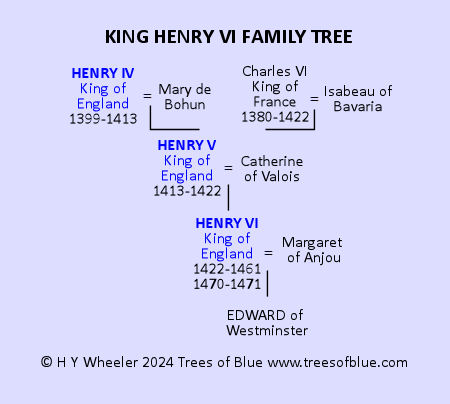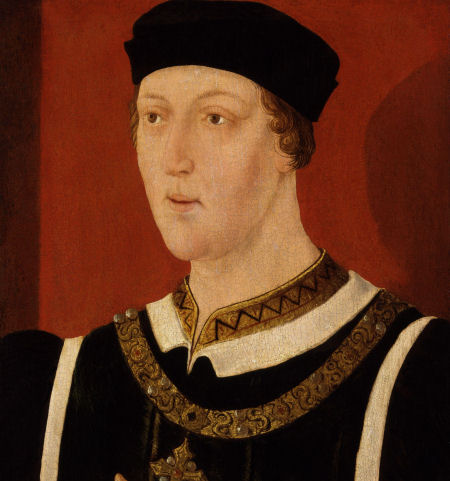King Henry VI (1421-1471) was a member of the House of Plantagenet. He succeeded his father, King Henry V to become the third King of the Lancastrian branch of the House of Plantagenet. As he matured he was subject to bouts of mental instability which led to a challenge by the Yorkist branch of the Plantagenets and his replacement by King Edward IV.
Contents
King Henry VI Family Tree Image
King Henry VI Family Tree in Table Form
King Henry VI Short Biography
King Henry VI Family Tree Image showing:
grandparents, parents, wife, child

King Henry V Family Tree in Table Form showing:
grandparents, parents, siblings, wife, children, grandchildren
GRANDPARENTS
Paternal Grandfather –Henry IV, King of England – (1368 – 1416)
Paternal Grandmother -Mary de Bohun – (1370 – 1394)
Maternal Grandfather – Charles VI, King of France – (1368 – 1422)
Maternal Grandmother – Isabeau of Bavaria – (1370 – 1435)
PARENTS
Father – Henry V, King of England – (1386 – 1422)
Mother – Catherine of Valois – (1401 – 1437)
SIBLINGS
No Siblings
MARRIED
Margaret of Anjou – (1430 – 1482)
CHILDREN
Edward of Westminster – (1453 – 1471)
GRANDCHILDREN
No grandchildren
King Henry VI Short Biography
Early Years
King Henry VI was born on 6th December 1421 to King Henry V and Catherine of Valois at Windsor Castle. Before he was a year old, on 1st September 1422, Henry’s father died and he became King of England. Because he was an infant, Henry’s uncles, John, Duke of Bedford, Humphrey Duke of Gloucester and their uncle, Cardinal Henry Beaufort, son of John of Gaunt, acted as regents.
In 1428, the young King began his education. Richard de Beauchamp, Earl of Warwick, was appointed his tutor.
Joan of Arc
On 21st October 1422, Charles VI of France died. As per the terms of the Treaty of Troyes 1420, Henry succeeded to the French throne. However, the French resented being ruled by the English and many gave support to the displaced son of Charles VI.
In March 1425, a young peasant girl, Joan of Arc, claimed to have visions where she heard the voice of God telling her to drive the English out of France and to take the Dauphin Charles to Reims for his coronation. She eventually persuaded the Dauphin to trust her and give her an army. She marched to Orleans and secured victory for the French.
After several more victories over the English, Joan crowned the Dauphin King Charles VII of France at Reims Cathedral on 17th July 1429.
On 23rd May 1430 Joan was captured and handed over to the English. She was interrogated and found guilty on a charge of wearing men’s clothing which was forbidden at that time. She was burned at the stake on 30th May 1431.
The conflict with France dragged on until 1435 when the Treaty of Arras formed an alliance between Burgundy and France which left England isolated and unable to continue a full-scale war.
Henry VI Assumed Control
In 1437 King Henry VI took personal rule of England. The conflict with France continued but it was clear that England could not win. The Treaty of Tours 1444 agreed a peace to be sealed with the marriage of King Henry VI and Margaret of Anjou. The couple were married at Titchfield Abbey, Hampshire on 23rd April 1445. They had one son, Edward, who was born in 1453. He died in battle in 1471.
The peace between England and France was short-lived and the war dragged on. By 1453 French gains meant that England’s only possession on the continent was Calais.
Wars of the Roses
In August 1453 King Henry VI suffered a mental breakdown and was unable to rule. Edmund Beaufort Duke of Somerset took control of the country. This angered Richard Duke of York who, as next in line to the throne, felt that he should have been asked to assume control. He was backed by Richard Neville, Earl of Warwick. By March 1454 York had sufficient support to replace Somerset.
In December 1454, Henry VI’s health improved sufficiently for him to regain control. He immediately restored Somerset as his chief advisor. Richard of York and the Earl of Warwick began raising troops against the King.
The Wars of the Roses, named after the red rose of Lancaster and the white rose of York, began on 22nd May 1455 with the Battle of St Albans. The Yorkists won the battle and Henry was captured. Richard of York took control of the country again. A year later Henry VI was freed and Richard Duke of York was dismissed.
In 1459, Richard Duke of York was defeated at Ludlow. He managed to escape to Ireland and sent his son, Edward, to the continent for safety. The family were attained and their lands and titles confiscated.
The following year, Richard of York and the Earl of Warwick, raised a force and invaded. On 30th December 1460 the Duke and his son Edmund were killed at the Battle of Wakefield.
Deposed
Richard of York’s son, Edward, assumed the title Duke of York and took control of the Yorkist army. On 4th March 1461, he entered London and took the throne as King Edward IV. Henry VI, who was still mentally unstable, was imprisoned in the Tower of London.
Richard Neville, Earl of Warwick was Edward’s chief advisor. After negotiating a peace with Scotland he began negotiating a peace with France to be sealed with the marriage of Edward to the French King’s sister.
However, Edward had secretly married Elizabeth Woodville. Edward gave his in-laws prominent positions and began taking advice from his father-in-law. By 1469, Warwick, frustrated by his lack of power over Edward, turned his attention to Edward’s younger brother, George, Duke of Clarence who he possibly intended to make King in Edward’s stead.
Warwick and George Duke of Clarence launched a rebellion against Edward but were defeated and fled to France. There they allied with Henry’s wife Margaret of Anjou.
Restoration and Murder
In 1470, with Warwick’s support, Henry VI was returned to the throne and Edward fled to Burgundy. Edward raised a new force and the following year he invaded England to re-take the throne. Warwick and Henry’s son, Edward were killed in battle.
In May 1471 Edward made a triumphant entry into London. It is believed King Henry VI was murdered in the Tower of London on the same day.
Published Mar 22 2022 @ 8:20 pm – Updated – Dec 16 2024
Harvard Reference for King Henry VI Family Tree:
Heather Y Wheeler. (2022 – 2025). King Henry VI Family Tree & Biography 1421 – 1471. Available: https://www.treesofblue.com/king-henry-vi-family-tree-1421-1471. Last accessed March 17th, 2025

